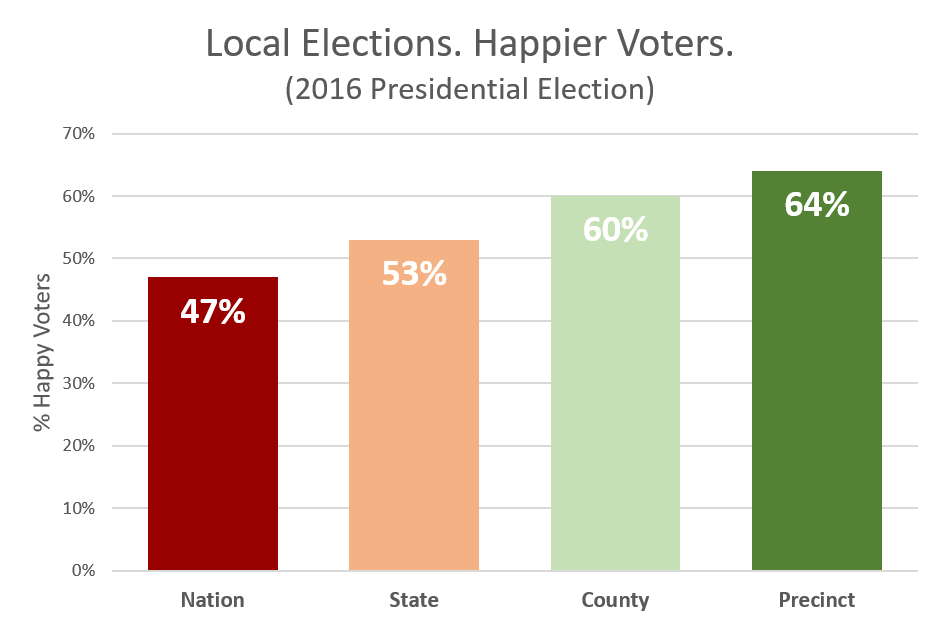As the State grows larger and more centralized, combat in the political arena will grow more desperate and extreme because there is more to be won and lost in each conflict. The States are trapped in an unhealthy relationship that deteriorates more each day. Rioting and looting have become acceptable responses to injustices both perceived and real. The Capital is walled off and surrounded by military personnel. As dire as the situation is, the solution is both obvious and simple: a breakup. The Mises Institute features numerous articles and podcasts on the ethical and philosophical arguments supporting radical decentralization. This article supplements those arguments with an analysis of the 2016 Presidential election to show that local elections lead to happier citizens.
One caveat for this analysis: it ignores the impact of the Electoral College. The debate over that institution is important, but not for the point being made here. Instead, this analysis assumes that the winner of the popular vote wins the election. It will then show how local elections result in far better outcomes than national ones. The election data comes from MITs Election Data and Science Lab and 2016 was chosen because it is the last year for which precinct-level totals are available.
In the 2016 election, Hillary Clinton won the popular vote with roughly 66 million votes; however, this constituted only 47% of the total votes cast. Even had Hillary won the election based on the popular vote, most Americans would have been unhappy with the result. In Texas, 52% of voters cast their ballot for Trump while 58% of New Yorkers chose Clinton. If Texas and New York were able to elect separate leaders, a majority of voters would be represented by the person they voted for. Fewer would feel disenfranchised.
The margins improve further as you zoom in to individual counties and precincts. The chart below shows how voter happiness (defined by your candidate winning) increases at smaller geographies. When looking at the precinct level, an impressive 64% of voters voted for the candidate who won in their precinct. That is almost 24 million additional voters that would be able to live under a representative they selected.

Source: Data compiled by author from MIT Election Data and Science Lab
This improvement in outcomes exists because human beings tend to join communities that align with their preferences and ideals (all else equal). This effect would strengthen if radical decentralization were to occur. As local governments wrest more power from central authorities, the variety among communities would increase. Voting with your feet would be cheaper when you only need to move between town or counties, and low-income individuals and families would be able to exercise this power to great effect along with everyone else.
This self-sorting would also lead to more peaceful communities. Eventually, Texans might care as little about New Yorkers’ thoughts on abortion as they do those of Cambodians. Austin could set policies independent of the rest of Texas. New York could implement a universal basic income. With more local control, the need to fight over national policy would no longer exist.
In 2016, we saw extreme emotional displays, marches, and rallies from Democrats after Hillary lost the election. In 2020, we saw the same from Trump supporters. Every four years, roughly half the country finds itself on the losing side of an election against an opponent they increasingly cannot relate to or even understand. As the State grows, so do the stakes. If our goal is a peaceful resolution, we must dismantle this locus of power. To control your own destiny, you must first give up the desire to control others.

